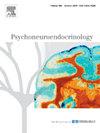Transcriptomics study of hippocampus in mice exposed to heat stress
IF 3.4
2区 医学
Q2 ENDOCRINOLOGY & METABOLISM
引用次数: 0
Abstract
Heat stress (HS) triggers various pathophysiological responses in the brain, including neuroinflammation and cognitive impairments. The objective of this study was to examine the impact of HS by comparing the hippocampal transcriptomes of mice exposed to HS with those under control conditions. Our analysis revealed that HS exposure did not affect the number of SNP or InDel mutations in the mouse hippocampus, nor did it influence SNP functions, distribution, or types. However, HS did lead to differential gene expression in the hippocampus, with 210 differentially expressed genes (DEGs), including 72 upregulated and 138 downregulated genes. Gene Ontology (GO) analysis indicated that these DEGs are involved in hippocampal responses to various stimuli (chemical, oxygen-containing compounds, peptide hormones), metabolic processes (arachidonic acid, olefinic compound metabolism, lipid metabolism), and other functions. The regulation of these functions may be closely linked to specific DEGs, such as Card14, Ntrk1, Lcn2, Irs4, Cyp2c70, Hamp, Ambp, Gh, Mup19, and others, which exhibit the highest degree of differential variation. Furthermore, we observed that pre-treatment with taurine primarily modulated cognitive functions in the hippocampus following HS. Therefore, our study offers valuable insights for future research on heat stress-induced cognitive impairments and provides a theoretical foundation for developing taurine-based preventive strategies for high-risk populations.
热应激小鼠海马转录组学研究。
热应激(HS)在大脑中引发各种病理生理反应,包括神经炎症和认知障碍。本研究的目的是通过比较暴露于HS的小鼠与对照组小鼠的海马转录组来研究HS的影响。我们的分析显示,HS暴露不影响小鼠海马中SNP或InDel突变的数量,也不影响SNP的功能、分布或类型。然而,HS确实导致了海马的差异基因表达,有210个差异表达基因(DEGs),其中72个基因上调,138个基因下调。基因本体(Gene Ontology, GO)分析表明,这些deg参与海马对各种刺激(化学、含氧化合物、肽激素)的反应、代谢过程(花生四烯酸、烯烃化合物代谢、脂质代谢)和其他功能。这些功能的调控可能与特定的deg密切相关,如Card14、Ntrk1、Lcn2、Irs4、Cyp2c70、Hamp、Ambp、Gh、Mup19等,它们表现出最大程度的差异变异。此外,我们观察到牛磺酸预处理主要调节HS后海马的认知功能。因此,本研究为今后热应激性认知障碍的研究提供了有价值的见解,并为制定基于牛磺酸的高危人群预防策略提供了理论基础。
本文章由计算机程序翻译,如有差异,请以英文原文为准。
求助全文
约1分钟内获得全文
求助全文
来源期刊

Psychoneuroendocrinology
医学-精神病学
CiteScore
7.40
自引率
8.10%
发文量
268
审稿时长
66 days
期刊介绍:
Psychoneuroendocrinology publishes papers dealing with the interrelated disciplines of psychology, neurobiology, endocrinology, immunology, neurology, and psychiatry, with an emphasis on multidisciplinary studies aiming at integrating these disciplines in terms of either basic research or clinical implications. One of the main goals is to understand how a variety of psychobiological factors interact in the expression of the stress response as it relates to the development and/or maintenance of neuropsychiatric illnesses.
 求助内容:
求助内容: 应助结果提醒方式:
应助结果提醒方式:


